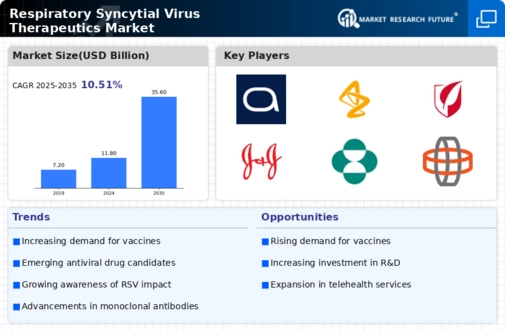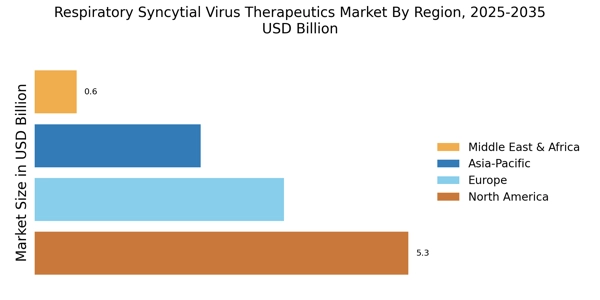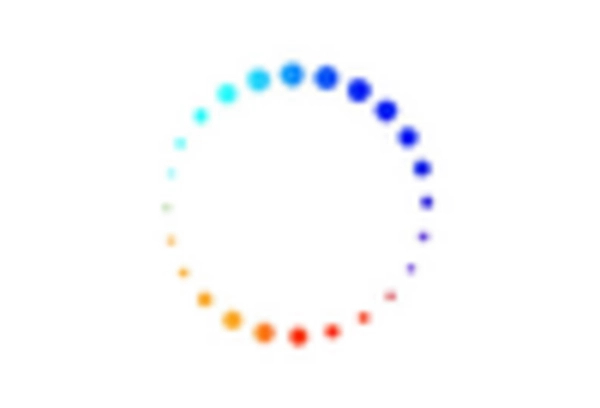Increased Healthcare Expenditure
The rise in healthcare expenditure across various regions is likely to bolster the Respiratory Syncytial Virus Therapeutics Market. Governments and private sectors are investing heavily in healthcare infrastructure, which includes funding for research and development of new therapeutics. This trend is particularly evident in countries with aging populations, where the burden of RSV is more pronounced. According to recent data, healthcare spending is expected to reach trillions of dollars in the next few years, with a significant portion allocated to infectious disease management. This financial commitment is anticipated to facilitate the development of innovative RSV therapeutics, thereby enhancing patient access to effective treatments and driving market growth.
Advancements in Therapeutic Technologies
Technological advancements in therapeutic modalities are significantly influencing the Respiratory Syncytial Virus Therapeutics Market. The emergence of novel antiviral agents and monoclonal antibodies has transformed treatment paradigms, offering new hope for patients affected by RSV. For instance, the introduction of palivizumab has demonstrated efficacy in preventing severe RSV disease in high-risk infants. Moreover, ongoing research into RNA-based therapies and small molecule inhibitors suggests a promising future for RSV treatment options. The market is projected to witness substantial growth, with estimates indicating a compound annual growth rate of over 10% in the coming years. These advancements not only enhance treatment efficacy but also expand the therapeutic landscape, catering to diverse patient needs and preferences.
Growing Awareness and Education Initiatives
Growing awareness and education initiatives regarding Respiratory Syncytial Virus are playing a crucial role in shaping the Respiratory Syncytial Virus Therapeutics Market. Public health campaigns aimed at educating parents and caregivers about the risks associated with RSV are likely to lead to earlier diagnosis and treatment. Increased awareness can result in higher demand for therapeutics, as more individuals seek medical intervention upon recognizing symptoms. Additionally, healthcare professionals are becoming more informed about the latest treatment options, which may influence prescribing practices. This heightened awareness is expected to contribute to market expansion, as stakeholders recognize the importance of addressing RSV effectively.
Regulatory Support for Therapeutic Development
Regulatory support for the development of new therapeutics is a significant driver for the Respiratory Syncytial Virus Therapeutics Market. Regulatory agencies are increasingly streamlining approval processes for innovative treatments, which may expedite the availability of new RSV therapeutics. Initiatives aimed at fostering innovation, such as fast-track designations and priority review vouchers, are likely to encourage pharmaceutical companies to invest in RSV research. This supportive regulatory environment is essential for bringing novel therapies to market more efficiently, thereby addressing the unmet medical needs of patients affected by RSV. As a result, the market is expected to experience accelerated growth, with a diverse range of therapeutic options becoming available.
Rising Incidence of Respiratory Syncytial Virus Infections
The increasing incidence of Respiratory Syncytial Virus infections, particularly among infants and the elderly, appears to be a primary driver for the Respiratory Syncytial Virus Therapeutics Market. Data indicates that RSV is responsible for a significant number of hospitalizations each year, with estimates suggesting that it leads to approximately 177,000 hospitalizations among children under five annually. This growing burden on healthcare systems necessitates the development and availability of effective therapeutics, thereby propelling market growth. Furthermore, the rising awareness of RSV's impact on vulnerable populations is likely to stimulate demand for innovative treatment options. As healthcare providers seek to mitigate the effects of RSV, investments in research and development are expected to increase, further enhancing the market landscape.


















